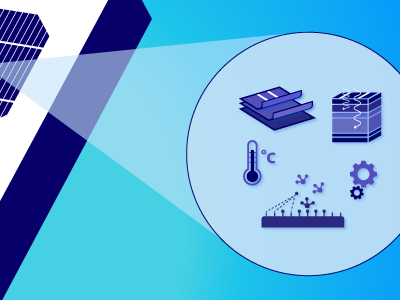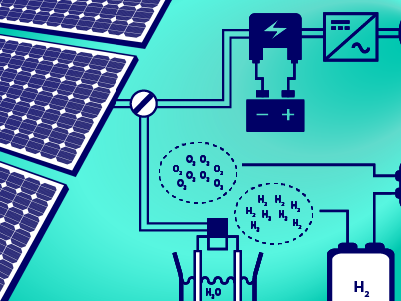Overview
Develop a critical attitude towards sustainability and reliability of photovoltaic (PV) technologies. Gain expertise in novel materials and technologies to minimize the environmental impact of solar modules.
The PV industry is estimated to grow its annual production to about 3TW in order to meet the >60 TW of cumulative installed photovoltaics by 2050 to meet the climate goals.
To be able to meet this target, many challenges need to be addressed and one of them is to replace materials that are toxic or scarce. Furthermore, recycling critical materials with respect to energy content, cost, and abundance will be key aspects.
These critical requirements for the large-scale deployment that is envisaged and required to make the step from renewable to fully sustainable PV in which recycled materials will be used in high-value applications.
In this course, you will be given a comprehensive view of the environmental impact of PV over its value chain, which is already positive. You will develop the skills to devise alternatives to further improve the environmental profile of photovoltaics by material use reduction and material recovery. You will discover how to conduct PV’s life cycle analysis (water consumption, C-footprint, etc.), accelerated lifetime testing and acquiring knowledge on cell and module degradation mechanisms, their recycling and much more.
The course will enable R&D researchers and process engineers working in the field of solar cell and module technology development whether in cell and module manufacturers or at equipment or material suppliers or labs, to enrich their understanding of reliability and sustainability of solar materials, devices, and modules.
Take this course at your own pace!
This online course offers access to course material 24/7 so you can learn at the time and place that suits you.
This course can be started at any time from 17 September 2025 until 1 December 2025, and it will be closed for all participants on 10 December 2025. Please note that all assignments should be submitted before the end date in order to obtain the certificate.
What You'll Learn
- Gain working knowledge pertaining to the reliability and sustainability of PV products.
- Gain insight and the ability to explain the role of new advances, innovations and circularity in manufacturing PV products and the impact this will have on the market.
- Gain insight on accelerated lifetime testing and degradation mechanisms.
- Acquire the competences and instruments to be able to tackle problems and challenges of PV technologies to improve their environmental profile.
- Develop a critical attitude towards sustainability of PV and gain the skills to establish alternative technologies to further improve the environmental profile of PV.
Details
Course Syllabus
Week 1: Environmental aspects of PV
- Carbon footprint
- Energy-pay-back-time
- Energy return on investment
Week 2: State-of-the-art
- Life Cycle Analysis (water consumption, C-footprint, etc.)
- Environmental impact of PV technologies (both c-Si and TF PV)
- Materials traditionally used in PV
Week 3: PV module technologies and accelerated lifetime testing
- Module build-up
- Functionality of module materials / module design
- Accelerated lifetime of PV modules
Week 4: Cell and module degradation
- Cell degradation mechanisms of Si (mechanism and impact on output: LID, LeTID)
- Module degradation mechanism of Si (PID, water ingress, mechanical stress)
- Degradation of TF PV (CIGS, a-Si)
Week 5: Novel materials and technologies to improve reliability
- Interconnection design (conductive adhesives versus soldering, mechanical pressure developed by the French company Apollon Solar)
- Different encapsulation materials and impact on for example PID, water ingress
- Glass-glass modules vs PV foil material (including challenges to maintain reliability, stress)
Week 6: Towards sustainable PV
- Introduction of technologies that will improve the environmental profile
- Less material consumption (Ag, In, Si)
- Replacement of several materials and impact (Pb, Cu instead of Ag, thin Si or Si foils)
- Module and cell recycling: state of the art and future prospects
Qualifications
Certificates
If you successfully complete this course you will earn a professional education certificate and you are eligible to receive 3 Continuing Education Units (CEUs).
Chartered Engineering Competences
All our online courses and programs have been matched to the competences determined by KIVI’s Competence Structure, a common frame of reference for everyone, across all disciplines, levels and roles.
These competences apply to this course:
- A1: Extend your theoretical knowledge of new and advancing technologies.
- E3: Undertake engineering activities in a way that contributes to sustainable development and a circular economy.
Admission
This course is geared towards professionals and graduates wanting to upskill themselves.
Prerequisites
Important prerequisites for this course are a basic understanding of the working principles of PV modules and some background knowledge about the different types of solar cells and their build-up.
Contact
If you have any questions about this course or the TU Delft online learning environment, please visit our Help & Support page.


